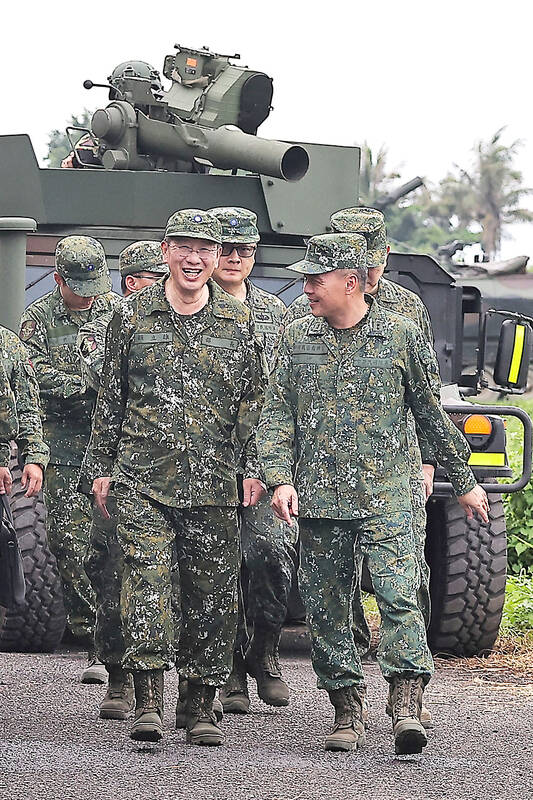Taiwan must show it is determined to defend itself no matter who wins the US presidency, Minister of National Defense Wellington Koo (顧立雄) said yesterday as the US election campaign entered its final hours.
Former US president Donald Trump — the Republican presidential candidate, who was neck and neck in the polls with US Vice President Kamala Harris of the Democratic Party — has made comments on the campaign trail that Taiwan should pay to be protected and also accused it of stealing US semiconductor business.
Taiwan has faced a sustained military pressure campaign from Beijing over the past five years, including four major rounds of war games in the past two years.

Photo: Ann Wang, Reuters
“No matter who is elected [US president], we have to let them understand that Taiwan has the determination to defend itself, and the importance of Taiwan’s economic security and strategic geopolitical position,” Koo said in response to media queries on the sidelines of a legislative session.
He said the government’s position was to continuously bolster its self-defense capabilities.
“We take the attitude of maintaining regional peace and stability in the Taiwan Strait to let the world see Taiwan’s value, whether in terms of economic security or Taiwan’s strategic geopolitical position, so that the world can see the important value of Taiwan,” Koo said, when asked if he was nervous that a Trump administration would abandon the nation.
An internal Taiwan security memo, a copy of which was reviewed by Reuters, said that China has recently launched a renewed propaganda campaign trying to stir up fears that Taiwan would become a “sacrificial piece” because the US is likely to change its support for Taiwan after the vote.
“The reality is that regardless of the election outcome supporting Taiwan has become a consensus,” the memo added.
China’s Taiwan Affairs Office, which last week implied that Trump as president could “discard” Taiwan, did not immediately respond to a request for comment.
While the US is Taiwan’s most important international backer and arms supplier, despite the absence of formal diplomatic ties, Taiwan has also made developing its own weapons systems a priority, such as missiles and submarines.
Taiwan has no formal defense pact with the US, as Asian neighbors Japan and South Korea do, after Washington terminated a previous treaty with Taipei in 1979 when it switched diplomatic recognition to Beijing.
However, some Taiwanese military personnel train in the US, including F-16 pilots, and Taipei has said that small numbers of US forces are in Taiwan in a training role.
Taiwan has reported an uptick in Chinese military activities as the US election approached, including China staging long-range air force drills into the Pacific passing through air space to the nation’s south.
Taiwan received strong backing from Trump’s first administration from 2017 to 2021, including arms sales, which have continued under US President Joe Biden’s White House.

A decision to describe a Chinese Ministry of Foreign Affairs statement on Singapore’s Taiwan policy as “erroneous” was made because the city-state has its own “one China policy” and has not followed Beijing’s “one China principle,” Deputy Minister of Foreign Affairs Tien Chung-kwang (田中光) said yesterday. It has been a longstanding practice for the People’s Republic of China (PRC) to speak on other countries’ behalf concerning Taiwan, Tien said. The latest example was a statement issued by the PRC after a meeting between Singaporean Prime Minister Lawrence Wong (黃循財) and Chinese President Xi Jinping (習近平) on the sidelines of the APEC summit

Taiwan’s passport ranked 34th in the world, with access to 141 visa-free destinations, according to the latest update to the Henley Passport Index released today. The index put together by Henley & Partners ranks 199 passports globally based on the number of destinations holders can access without a visa out of 227, and is updated monthly. The 141 visa-free destinations for Taiwanese passport holders are a slight decrease from last year, when holders had access to 145 destinations. Botswana and Columbia are among the countries that have recently ended visa-free status for Taiwanese after “bowing to pressure from the Chinese government,” the Ministry

HEALTHCARE: Following a 2022 Constitutional Court ruling, Taiwanese traveling overseas for six months would no longer be able to suspend their insurance Measures allowing people to suspend National Health Insurance (NHI) services if they plan to leave the country for six months would be abolished starting Dec. 23, NHIA Director-General Shih Chung-liang (石崇良) said yesterday. The decision followed the Constitutional Court’s ruling in 2022 that the regulation was unconstitutional and that it would invalidate the regulation automatically unless the NHIA amended it to conform with the Constitution. The agency would amend the regulations to remove the articles and sections that allow the suspension of NHI services, and also introduce provisional clauses for those who suspended their NHI services before Dec. 23, Shih said. According to

Minister of Labor Ho Pei-shan (何佩珊) yesterday apologized after the suicide of a civil servant earlier this month and announced that a supervisor accused of workplace bullying would be demoted. On Nov. 4, a 39-year-old information analyst at the Workforce Development Agency’s (WDA) northern branch, which covers greater Taipei and Keelung, as well as Yilan, Lienchiang and Kinmen counties, was found dead in their office. WDA northern branch director Hsieh Yi-jung (謝宜容), who has been accused of involvement in workplace bullying, would be demoted to a nonsupervisory position, Ho told a news conference in Taipei. WDA Director-General Tsai Meng-liang (蔡孟良) said he would